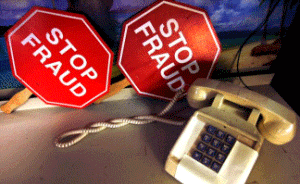New law will give regulators more oversight of charities
by Kris Hundley, Times Staff Writer
NOTICE: THIS WORK MAY BE PROTECTED BY COPYRIGHT
YOU ARE REQUIRED TO READ THE COPYRIGHT NOTICE AT THIS LINK BEFORE YOU READ THE FOLLOWING WORK, THAT IS AVAILABLE SOLELY FOR PRIVATE STUDY, SCHOLARSHIP OR RESEARCH PURSUANT TO 17 U.S.C. SECTION 107 AND 108. IN THE EVENT THAT THE LIBRARY DETERMINES THAT UNLAWFUL COPYING OF THIS WORK HAS OCCURRED, THE LIBRARY HAS THE RIGHT TO BLOCK THE I.P. ADDRESS AT WHICH THE UNLAWFUL COPYING APPEARED TO HAVE OCCURRED. THANK YOU FOR RESPECTING THE RIGHTS OF COPYRIGHT OWNERS.
Sunday, May 25, 2014 9:21pm

SCOTT KEELER | Times (2013)This telephone line in the Iowa Attorney General’s office is answered by a staff member who records telemarketers’ pitches. The recordings can later be used to bring lawsuits against charities and telemarketers for making misleading statements.
Telemarketers with criminal backgrounds will no longer be able to call Floridians for charitable donations.
Nonprofits and professional solicitors banned in one state will be banned in Florida as well.
And consumers will be able to go online for more details about how a charity uses its donations under a bill Gov. Rick Scott is expected to sign into law.
Lawmakers proposed the sweeping changes following a yearlong investigation by the Tampa Bay Times and the Center for Investigative Reporting that ranked the worst charities in America based on which groups spent the most on professional solicitation companies. Of the 50 charities with the worst records, 11 were based in Florida, more than any other state.
With the reforms, Florida will have the tools to transform itself from one of the nation's most lax charity regulators to among the most aggressive. And because the rules apply to any organization that raises money in Florida, the impact of the changes could be felt nationwide.
Ken Berger, president and chief executive of Charity Navigator, an industry watchdog group, praised the changes, saying, "I'm in favor of anything that provides further enforcement and oversight to eliminate unethical and fraudulent behaviors."
The pending law gives Florida's Department of Agriculture and Consumer Services, which oversees more than 17,000 charities and 130 professional solicitors, additional manpower and stronger financial penalties for wrongdoers.
Three positions will be added, at a cost of about $415,000, to investigate charity-related complaints. Maximum fines will be increased to $5,000 for most violations and $10,000 for fraud.
The bill would also give Florida regulators the power to revoke a charity's state sales tax exemption for certain violations.
Bigger charities also will get additional scrutiny starting in July.
Under the new rules, charities with more than $500,000 in contributions will be required to have an independent certified public accountant review their finances; those with more than $1 million must publicly file an annual financial audit. Audits already are required by several states and give the public a more complete picture of a charity's finances, including related-party transactions, than its IRS filing.
All charities that raise donations in Florida would be required to file a financial statement that shows how much they spend on their mission. Any charity that raises more than $1 million but reports spending less than 25 percent on program services would be required to file additional information about salaries, travel expenses and fundraising costs.
The bill also gives regulators more time to check an applicant's record by extending the mandated turnaround time on annual registrations from 15 to 90 days. If the charity or fundraiser has had its right to solicit revoked in another state, Florida officials will be able to block the group from operating in Florida. Berger said he was not aware of any other state that had such a provision.
The Times/CIR report found at least a dozen cases where a charity or a solicitor had been forced out of one jurisdiction but continued operating elsewhere because state regulators don't systematically share information.
A spokeswoman for Agriculture Commissioner Adam Putnam's office said the department will rely on information from other states, as well as tips from media and charities to identify wrongdoers.
The bill also puts teeth into an existing law prohibiting people convicted of certain financial crimes from soliciting for charities.
Previously, employers were not required to do background checks of their employees. Under the new rules, such screening is mandatory for telemarketers who take donors' financial information.
Kris Hundley can be reached at khundley@tampabay.com or (727) 892-2996.
New law will give regulators more oversight of charities 05/25/14 [Last modified: Monday, May 26, 2014 8:35am]
© 2014 Tampa Bay Times
